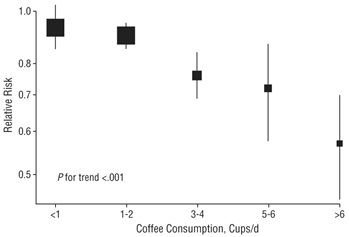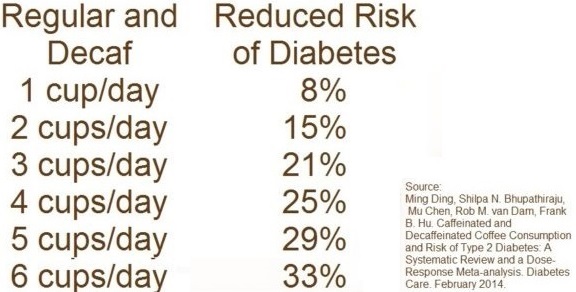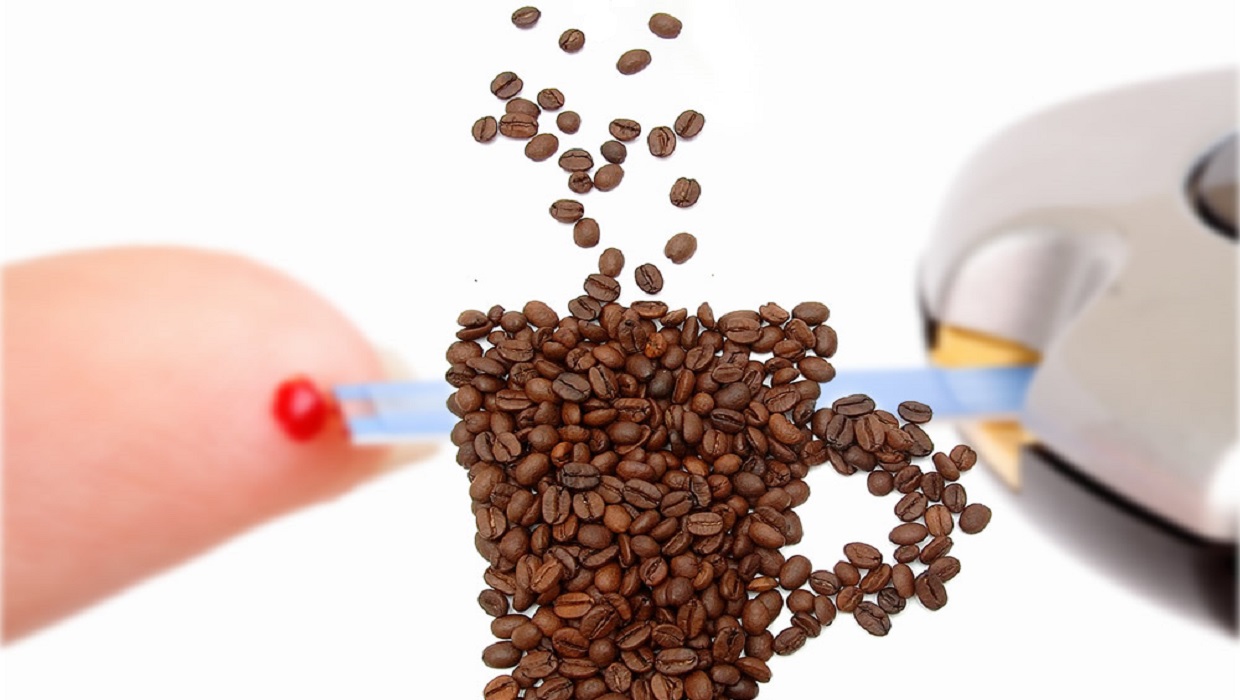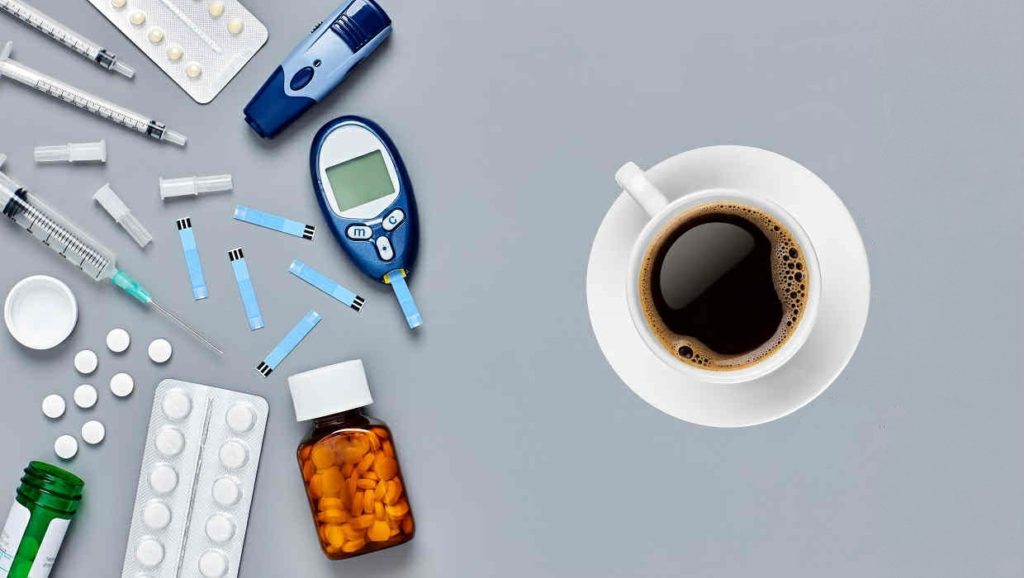Can Coffee Prevent Type 2 Diabetes?
A growing body of evidence shows that coffee prevents type 2 diabetes.
Type 2 diabetes is a massive health problem that’s about to get worse. A recent study concluded that 40% of Americans alive today are expected to get the disease. Left untreated, the soaring blood sugar caused by type 2 diabetes creates serious health problems throughout the body, including heart disease, stroke, loss of limbs, kidney failure, blindness, and double the risk of death.
Research has shown that drinking coffee is a way to prevent type 2 diabetes.
Research On Coffee And Diabetes
Dozens of observational research studies have documented the many health benefits of coffee. The studies reached various conclusions, some concluded that coffee prevents diabetes by a great deal, others not all. The wide range of results reported confused the public.
To end the confusion, two major systematic reviews analyzed coffee’s link with type 2 diabetes. The Huxley study came out in 2009, followed by the Ding study in 2014. The authors of these two systematic reviews averaged the data from all the published studies that had up until that time examined the link between coffee drinking and type 2 diabetes.

Huxley Finds Coffee Prevents Type 2 Diabetes
The Huxley study showed that the more coffee you drink, the lower your risk of type 2 diabetes. In 2009, Rachel Huxley and colleagues published a massive systematic review to analyze the health benefits of coffee. The team collected data from 18 published studies that had a combined total of nearly 458,000 participants. When compared to people who drank very little coffee, Huxley found that each additional cup of coffee was linked to a 7% reduced risk of developing type 2 diabetes. People obtained the maximum health benefit of coffee by drinking 6 cups daily.

Ding Finds Coffee Type 2 Prevents Diabetes
In 2014, Ding and colleagues updated the work of Rachel Huxley. The team added doubled the amount of data. This time, they gathered data from 28 published studies with a combined total of 1.1 million participants. The research team followed the participants anywhere from 10 months to 20 years. In total, Ding analyzed more than 45,000 cases of type 2 diabetes.
Ding reported that both decaf and regular coffee provided health benefits. Both forms of the beverage were shown to protect against type 2 diabetes. Compared with those who drank no coffee, habitual coffee consumers had a reduced risk of developing type II diabetes. As the chart above shows, the health benefit of coffee varied depending on how many cups they drank daily.
Decaf vs. Regular
As a secondary finding, Ding found that regular brewed coffee prevents diabetes better than decaf. Ding found that the risk of diabetes dropped by 9% for each additional cup of regular coffee consumed and by only 6% for the decaf. Ding wasn’t sure about this finding because the study participants tended to drink both decaf and regular. While Ding’s most important conclusion was backed by statistical accuracy, this secondary finding was not. Based on this, Ding concluded that both decaf and regular coffee provide health benefits. Ding commented:
Ding wasn’t sure about this finding because the study participants tended to drink both decaf and regular. While Ding’s most important conclusion was backed by statistical accuracy, this secondary finding was not. Based on this, Ding concluded that both decaf and regular coffee provide health benefits. Ding commented:
“Coffee consumption was inversely associated with the risk of type 2 diabetes in a dose-response manner. Both caffeinated and decaffeinated coffee was associated with reduced diabetes risk.”
The decaffeinating process removes caffeine, but may also eliminate or alter some other bioactive compounds. Other evidence supports this theory, showing that processing removes nutrients and while whole foods retain them. To get the health benefits of coffee, it’s best to consume it caffeinated if you can tolerate it.

Consuming coffee in moderate amounts is linked to a reduced risk of type 2 diabetes. Two extensive observational studies showed that the risk of developing type 2 diabetes dropped by 7% to 9%, for each additional cup of coffee consumed daily. People obtained the maximum health benefit of coffee by drinking up to 6 cups daily.
However, the best way to prevent type 2 diabetes is by maintaining a healthy weight by eating plenty of fruits and veggies. In fact, the magazine US News and World Report ranks the fruit-and-veggie-rich DASH Diet plan as being one of the best for diabetes.
Recently, additional good news has come out on the health benefits of coffee. The positive evidence on coffee is mounting up. Read more about the health benefits of coffee in the linked report.
Help Us Spread the Word
Please share this post and help us spread the word. All it takes is a simple click on either of the Google+ or Facebook links at the bottom of this page.
For weekly updates, check out our series called Living Healthy to 120 on Google+.
Disclaimer
Advice, Diagnosis, and Treatment: This article is intended for informational and educational purposes only and is not a substitute for professional medical advice. The information provided herein should not be used during any medical emergency or for the diagnosis or treatment of any medical condition. Consult a licensed physician for the diagnosis and treatment of any and all medical conditions. Call 911, or an equivalent emergency hotline number, for all medical emergencies. As well, consult a licensed physician before changing your exercise, diet, or supplement programs. Photos, External Links & Endorsements: This article is not intended to endorse companies, organizations or products. Links to external websites, depiction/mention of company names or brands, are intended only for illustration and do not constitute endorsements.
References
Ming Ding, Shilpa N. Bhupathiraju, Mu Chen, Rob M. van Dam and Frank B. Hu. Caffeinated and Decaffeinated Coffee Consumption and Risk of Type 2 Diabetes: A Systematic Review and a Dose-Response Meta-analysis. Diabetes Care. February 2014. 37 (2) 569-586; DOI: 10.2337/dc13-1203. Available Online.
E Thom. The Effect of Chlorogenic Acid Enriched Coffee on Glucose Absorption in Healthy Volunteers and Its Effect on Body Mass When Used Long-term in Overweight and Obese People. The Journal of International Medical Research; Vol 35, Issue 6, pp. 900 – 908: June-25-2016; 10.1177/147323000703500620. Available Online.
Zhang, E.T. Lee, L.D. Cowan, R.R. Fabsitz, B.V. Howard. Coffee consumption and the incidence of type 2 diabetes in men and women with normal glucose tolerance: The Strong Heart Study. Nutrition, Metabolism, and Cardiovascular Diseases 21 (6), 2011, p.418; doi:10.1016/j.numecd.2009.10.020. Available Online.
Rachel Huxley, DPhil; Crystal Man Ying Lee, Ph.D.; Federica Barzi, Ph.D. Coffee, Decaffeinated Coffee, and Tea Consumption in Relation to Incident Type 2 Diabetes Mellitus – A Systematic Review With Meta-analysis. Archives Internal Medicine. 2009;169(22):2053-2063. doi:10.1001/archinternmed.2009.439. Available Online.

6 Replies to “Can Coffee Prevent Type 2 Diabetes?”
Comments are closed.